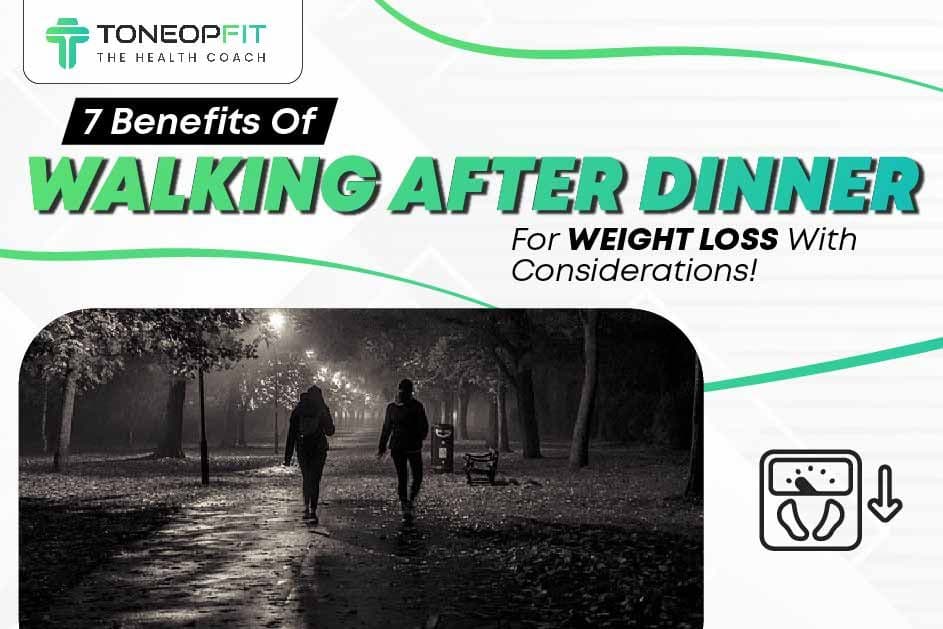Walking after dinner emerges as an achievable form of physical activity with significant promise for weight loss. As a simple yet effective exercise option, walking after dinner for weight loss also offers other advantages beyond its physical benefits, such as calorie burning and metabolism enhancement, that contribute to holistic wellness. However, while walking after dinner has many benefits, certain considerations must be made to optimise its effectiveness and ensure safety.
As the World Health Organization (WHO) revealed, the global prevalence of insufficient physical activity underscores a pressing need for accessible and effective strategies to promote exercise. Over 25% of adults, or 1.4 billion adults worldwide, fall short of recommended activity levels. This indicates that roughly one in four men and one in three women do not try to get enough physical movements to stay healthy. This is why initiatives like walking after dinner offer a promising avenue for enhancing overall fitness.
In light of these statistics, let’s explore the benefits of walking after dinner for weight loss, including considerations addressing sedentary lifestyles, which contribute to healthier habits.
Table Of Contents
1. Does Walking At Night Reduce Wight?
2. Is A 10 Minute Walk After Dinner Good?
3. What Is The Best Time To Walk To Lose Weight?
4. What Should I Do After Dinner To Lose Weight?
5. Expert’s Recommendation
6. The Final Say
7. FAQs
8. References
Does Walking At Night Reduce Wight?
Walking is a simple and feasible way to improve physical and mental health. It may help burn calories, reduce stress, improve mood, and lower blood pressure. While there is a belief that walking right after eating can cause fatigue, stomachache and other discomforts, one study, in which one volunteer had no such adverse reaction, found that walking right after dinner was more preferred for weight loss than waiting an hour after eating to walk.
For people who do not feel discomfort such as abdominal pain or fatigue when walking immediately post-meal, walking at a brisk pace for 30 minutes immediately after lunch or dinner has a greater weight loss effect than walking for the first 30 minutes an hour after a meal. Among those who walked quickly, some lost close to 3 kg, while the volunteer participants who walked normally lost close to 1.5 kg just by walking right after lunch and dinner for a month.
Therefore, walking at night offers many benefits, whether it helps you digest food, relieves stress after a long day, or prepares your body for a good night’s sleep. Even a night walk can help you lose weight!
Also Read: Step Up Your Health: Learn The Benefits Of Brisk Walking Every Day!
Is A 10 Minute Walk After Dinner Good?

Let’s explore the benefits of walking after dinner for weight loss that might surprise you:
1. Keeps Your Blood Sugar In Control
Walking after a meal helps control blood sugar levels. A study in the Journal of Sports Medicine found that when people take a light walk after a meal, their blood sugar levels rise and fall more gradually than when they stand or remain seated. The participants’ insulin levels remained more stable when walking than standing or sitting.
Blood sugar levels typically spike 60 to 90 minutes after a meal, so it’s best to start walking as soon as possible. You can walk after a meal, but since many people become less active after dinner, this is a good time for a brisk walk.
2. Improves Your Digestion Process
Taking a walk after a meal helps with digestion. A PLOS One study found that walking stimulates the stomach and intestines. This can help food pass through your digestive system faster. It may also help reduce bloating, especially in people with irritable bowel syndrome.
Bloating occurs when undigested food breaks down, and gas builds up in the digestive tract. Bloating also happens when you swallow air while eating or drinking. Physical activity, like brisk walking after dinner for weight loss, can also help move some excess gas through the digestive tract.
3. Lowers Your High Blood Pressure
Walking after a meal also helps lower blood pressure. High blood pressure is a major cause of heart disease and stroke, so it’s important to find ways to lower it. A study published in the Journal of Family Medicine and Primary Care found that walking 10 minutes three times daily may help lower diastolic blood pressure in people with prehypertension.
Mealtimes can be a convenient excuse for a short walk. Additional research has shown that walking effectively lowers diastolic and systolic blood pressure in adults with high blood pressure. Patients with more severe hypertension experienced greater reductions.
4. Help To Burn Calories
Taking a walk after a meal can help you lose weight. Traditional weight loss plans say that to lose one pound of fat, you must burn 3,500 calories. To lose one pound, you must create and maintain a calorie deficit of 500 calories per day, seven days weekly. However, this formula is more of a guideline than an immutable rule. But if you want to use this as a basis for weight loss, one way to create this deficit is to walk right after eating.
Walking speeds up your metabolism, helping you burn more calories from fat. The average person weighing 150 pounds burns about 100 calories per mile while walking moderately. This number can increase if you walk longer or faster. It takes the average person about 20 minutes to walk a mile, so walking for 30 minutes after a meal at a moderate pace can help burn up to 150 calories.
5. Stimulates Hormones To Boost Mood
Taking a walk after a meal can help you feel better. Exercise helps reduce levels of stress hormones, such as cortisol, in the body. It also increases the production of positive hormones such as endorphins and oxytocin (also known as the love hormone). This hormone improves your mood and helps you fall asleep faster and stay asleep longer.
6. Strengthens Your Muscles Groups
Walking, especially on hilly terrain, on paths with steps, or inclines on a treadmill, can help strengthen your leg muscles. You can increase your strength by adding exercises such as leg curls, lunges, and squats or cross-training such as jogging or cycling. Joint pain relief Walking helps protect your joints, including your hips and knees, by lubricating the muscles that support them. It can also help relieve pain if you have arthritis. In fact, walking 5 to 6 miles at least once a week can help prevent arthritis.
7. Improves Your Immune Function
Walking reduces your risk of catching a cold or flu. A study of 1,000 people aged 18 and older during the flu outbreak found that people who walked at a moderate speed/pace daily for 30 to 45 minutes experienced 43% fewer sick days and fewer upper respiratory infections. If you live in a cold climate or can’t get outside, you can experience these health benefits by walking indoors or on the treadmill daily.
Also Read: Top 10 Summer Workout Tips: Exercises & Workout Plans For Lasting Results!
What Is The Best Time To Walk To Lose Weight?
How long you choose to go for a walk usually depends on your personal preferences, goals, and schedule. Walking at any time of day is better than not walking at all, but if your primary motivation for walking is weight loss, both morning and evening walks can help you achieve your goal. However, there may be some differences in their effect on weight loss progress.
1. Walking in the morning helps you burn fat more efficiently because your body uses fat as its primary energy source when exercising before breakfast. It also helps curb hunger and reduce the urge to snack throughout the day.
2. An evening walk can help you burn more calories overall because your body uses more energy when exercising after a meal. It may also help prevent overeating at night and reduce blood sugar spikes after dinner.
3. The best time to walk for weight loss depends on personal preference and lifestyle. Some people find it easier to follow a morning routine, while others prefer an evening walk after dinner. The most important thing Is to be consistent and enjoy your walks.
4. A brisk 10-minute walk after dinner for weight loss each day also offers many health benefits and counts towards the 150 minutes of weekly exercise recommended by the NHS.
Once walking is firmly established in your daily routine, you can gradually increase the pace and intensity of your walking to improve your health and well-being further.
Also Read: 5 Best Forearm Exercises And Workout Plan For Beginners!
What Should I Do After Dinner To Lose Weight?
Note some healthiest things to do after dinner to lose weight for reference:
After Dinner Actions | Impact | Tips |
Drink warm water | Having a glass of warm water 30 minutes before dinner enhances digestion and aids in controlling appetite. After dinner, wait at least 30 minutes before drinking warm water, as it aids in breaking down food and nutrient absorption. | Avoid drinking too much water during meals to prevent interference with digestion. |
Don’t go to bed immediately. | Resist the urge to lie down right after dinner. Waiting at least 2 hours before bedtime allows proper digestion, reducing the likelihood of bloating and heartburn. | Engage in light activities post-dinner, such as walking or chores, to promote digestion and enhance sleep quality. |
Take a short walk | Waiting 30 minutes after dinner and taking a brief walk helps in digestion and prevents discomfort such as bloating. Walking post-dinner benefits overall body health and can be encouraged by having a pet for companionship. | Even a brief walk around the house for 15-20 minutes can be beneficial post-dinner. |
Brush your teeth | Brushing teeth after waiting about 30 minutes after dinner helps maintain oral hygiene. The American Dental Association recommends brushing before bedtime to remove plaque and maintain oral pH. | Ensure thorough brushing for two minutes, covering all areas of the mouth, using a soft toothbrush and quality toothpaste. |
No smoking | Avoid smoking after dinner as it relaxes the lower oesophagal sphincter, leading to heartburn. Smoking worsens symptoms of digestive disorders and affects colon health. Also, smoking contains carcinogens and nicotine, which pose various health risks. | Resist the urge to smoke after dinner to prevent heartburn and maintain digestive health. |
Don’t shower | Showering immediately after dinner may interfere with digestion by reducing body temperature. Preferably, bathe before dinner and change into comfortable attire to avoid disrupting the digestive process. | Wait at least 30 to 45 minutes after dinner before showering to allow for proper digestion. |
Wear loose-fitting clothes | Opt for loose and comfortable clothing during and after dinner to prevent pressure on the stomach, which can lead to heartburn. Changing into light attire post-dinner aids in better sleep quality and temperature regulation. | Wear loose-fitting clothing during and after dinner to prevent stomach pressure and heartburn. |
Say no to fruit | While fruit is nutritious, consuming it immediately after dinner hampers digestion due to its sugar content. Diabetics should be cautious with fruit consumption due to its impact on blood sugar levels. | Avoid consuming fruit immediately after dinner to prevent interference with digestion. Eat fruit 30 minutes before dinner to aid digestion effectively. |
Expert’s Recommendation
Keep in mind that walking after dinner for weight loss doesn’t have to be all or nothing. If you can manage just a few minutes first, it’s better than not walking at all. It could be as simple as parking farther away from the entrance if you’re going out for lunch or taking the stairs instead of the elevator on your way back to your desk. If you work from home, try going for a short walk during your afternoon break between meetings. The most important thing is to develop the habit of walking after meals and maintain consistency in your daily life as much as possible.
Health Expert
Lavina Chauhan
The Final Say
Walking after dinner for weight loss is a healthy habit that can seamlessly be integrated into your daily routine. The benefits of walking after dinner for weight loss are immense for overall health and fitness, as it improves digestion, lowers blood pressure and balances blood sugar levels. Also, walking for weight loss is good if you follow other exercises and diet correctly. Though, remember you cannot lose weight quickly just by walking alone! Consistency and patience are key when it comes to achieving sustainable weight loss goals. So, lace up your shoes, step outside, and enjoy the many benefits of this simple yet effective habit.
FAQs
1. Is walking after dinner good for weight loss?
Yes, walking after dinner can aid in weight loss. It helps burn calories, improve metabolism, and regulate blood sugar levels, which are all essential factors for weight management.
2. Can walking after dinner reduce belly fat?
While walking after dinner can contribute to overall weight loss, specifically targeting belly fat may require a mix of regular exercise, a well-rounded nutritious diet, and lifestyle changes. Walking alone may not solely target belly fat reduction but can contribute to overall weight loss, including a reduction in abdominal fat over time.
3. How often should I do brisk walking after dinner to lose weight?
Incorporating brisk walking into your routine after dinner can aid in weight loss. Aim for nearly 30 minutes of brisk walking often weekly to effectively burn calories and promote weight loss. However, individual results depend on consistency for seeing progress.
4. What are the benefits of walking after dinner at night?
There are many walking after dinner benefits, including improved digestion, better blood sugar control, enhanced metabolism, stress reduction, and better sleep quality. It also provides an opportunity for light exercise, which contributes to overall health and well-being.
5. How many steps should you walk a day?
Walking more than 10,000 steps daily is recommended to maintain a healthy body, which is approximately equivalent to walking around 3 miles. However, the optimal number of steps may vary depending on individual fitness goals, age, weight, and overall health condition.
References
- https://www.who.int/news-room/fact-sheets/detail/physical-activity
- https://doctors-hospital.net/blog/entry/5-benefits-of-walking-after-eating?amp=true
- https://www.ncbi.nlm.nih.gov/pmc/articles/PMC3119587/
- https://www.livewelldorset.co.uk/faq/get-active/when-is-the-best-time-to-go-for-a-walk-morning-or-evening/
- https://timesofindia.indiatimes.com/life-style/health-fitness/weight-loss/weight-loss-can-walking-after-dinner-help-you-lose-weight/amp_articleshow/69990343.cms
- https://www.healthshots.com/fitness/weight-loss/night-walk-benefits/amp
- https://www.ekachaihospital.com/en/10-healthy-things-to-remember-before-and-after-you-eat-dinner/
About ToneOp Fit
ToneOp Fit is a platform dedicated to improving and maintaining good health through a comprehensive range of goal-oriented health plans with up to 3 Coach support. With a range of Weight Management, Medical Condition, Detox Plans, and Face Yoga Plans, the app also provides premium health trackers, recipes and health content. Get customised diet, fitness, naturopathy & yoga plans and transform yourself with ToneOp.










































